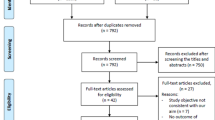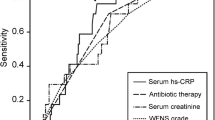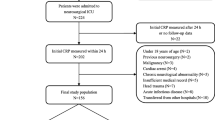Abstract
Background
Aneurysmal subarachnoid haemorrhage (SAH) is a severe disease with high case-fatality and morbidity rates. After SAH, the value of C-reactive protein (CRP)—an acute phase sensitive inflammatory marker—as a prognostic factor has been poorly studied, with conflicting results. In this prospective study, we tested whether increased CRP levels increase independently the risk for cerebral infarct and poor outcome.
Methods
Previous diseases as well as clinical, laboratory and radiological variables were recorded for 178 patients with SAH admitted within 48 h and with aneurysms occluded within 60 h after bleeding. Plasma CRP was measured, as well as computed tomography (CT) scans routinely obtained on admission, in the morning after aneurysm occlusion, and at discharge during second week after SAH. Factors predicting occurrence of cerebral infarct and poor outcome at 3 months after SAH were tested with multiple logistic regression.
Results
CRP levels increased significantly (p < 0.001) between hospital admission (mean ± SD, 11.4 ± 21.3 mg/l) and the postoperative morning (27.0 ± 31.0 mg/l) and then decreased (p < 0.001) during the the second week (19.8 ± 25.0 mg/l). Admission (18.0 ± 35.7 vs 8.5 ± 8.4 mg/l) and postoperative (41.0 ± 40.2 vs 21.1 ± 24.1 mg/l) CRP levels were higher (p < 0.001) in those with a poor outcome than in those with a favourable outcome, but CRP values did not predict delayed cerebral ischaemia or cerebral infarction. CRP levels did not independently predict outcome, since these correlated with admission clinical grade and occurrence of intraventricular haemorrhage. Higher increase in CRP level between admission and postoperative morning, however, independently predicted poor outcome (p = 0.004). Part of this increased risk was likely due to an appearance of early postoperative cerebral infarction.
Conclusions
CRP levels correlate with outcome but do not seem to predict delayed cerebral ischaemia or infarction after SAH.
Similar content being viewed by others
References
Al-Tamimi YZ, Orsi NM, Quinn AC, Homer-Vanniasinkam S, Ross SA (2010) A review of delayed ischemic neurologic deficit following aneurysmal subarachnoid hemorrhage: historical overview, current treatment, and pathophysiology. World Neurosurg 73:654–667
Brotman DJ, Girod JP, Garcia MJ, Patel JV, Gupta M, Posch A, Saunders S, Lip GY, Worley S, Reddy S (2005) Effects of short-term glucocorticoids on cardiovascular biomarkers. J Clin Endocrinol Metab 90:3202–3208
Buckley DI, Fu R, Freeman M, Rogers K, Helfand M (2009) C-reactive protein as a risk factor for coronary heart disease: a systematic review and meta-analyses for the U.S. preventive services task force. Ann Intern Med 151:483–495
Dorhout Mees SMD, van Dijk GW, Algra A, Kempink DR, Rinkel GJ (2003) Glucose levels and outcome after subarachnoid hemorrhage. Neurology 61:1132–1133
Drake CG (1988) Report of world federation of neurological surgeons committee on a universal subarachnoid hemorrhage grading scale. J Neurosurg 68:985–986
Elkind MS, Luna JM, Moon YP, Liu KM, Spitalnik SL, Paik MC, Sacco RL (2009) High-sensitivity C-reactive protein predicts mortality but not stroke: the Northern Manhattan study. Neurology 73:1300–1307
Fisher CM, Kistler JP, Davis JM (1980) Relation of cerebral vasospasm to subarachnoid hemorrhage visualized by computerized tomographic scanning. Neurosurgery 6:1–9
Fountas KN, Tasiou A, Kapsalaki EZ, Paterakis KN, Grigorian AA, Lee GP, Robinson JS Jr (2009) Serum and cerebrospinal fluid C-reactive protein levels as predictors of vasospasm in aneurysmal subarachnoid hemorrhage. Clinical article. Neurosurg Focus 26:E22
Haley EC Jr, Kassell NF, Torner JC (1993) A randomized controlled trial of high-dose intravenous nicardipine in aneurysmal subarachnoid hemorrhage. A report of the cooperative aneurysm study. J Neurosurg 78:537–547
Haley EC Jr, Kassell NF, Torner JC, Truskowski LL, Germanson TP (1994) A randomized trial of two doses of nicardipine in aneurismal subarachnoid hemorrhage. A report of the cooperative aneurysm study. J Neurosurg 80:788–796
Ilveskero S, Juvela S, Siironen J, Lassila R (2005) D-dimer predicts outcome after aneurysmal subarachnoid hemorrhage: no effect of thromboprophylaxis on coagulation activity. Neurosurgery 57:16–24
Inagawa T (2001) Trends in incidence and case fatality rates of aneurysmal subarachnoid hemorrhage in Izumo City, Japan, between 1980–1989 and 1990–1998. Stroke 32:1499–1507
Jennett B, Bond M (1975) Assessment of outcome after severe brain damage. Lancet 1:480–484
Juvela S (2002) Natural history of unruptured intracranial aneurysms: risks for aneurysm formation, growth, and rupture. Acta Neurochir Suppl 82:27–30
Juvela S (2003) Prehemorrhage risk factors for fatal intracranial aneurysm rupture. Stroke 34:1852–1858
Juvela S, Siironen J (2012) Early cerebral infarction as a risk factor for poor outcome after aneurysmal subarachnoid haemorrhage. Eur J Neurol. doi:10.1111/j.1468-1331.2011.03523.x
Juvela S, Siironen J, Kuhmonen J (2005) Hyperglycemia, excess weight, and history of hypertension as risk factors for poor outcome and cerebral infarction after aneurysmal subarachnoid hemorrhage. J Neurosurg 102:998–1003
Juvela S, Siironen J, Varis J, Poussa K, Porras M (2005) Risk factors for ischemic lesions following aneurysmal subarachnoid hemorrhage. J Neurosurg 102:194–201
Kasius KM, Frijns CJM, Algra A, Rinkel GJE (2010) Association of platelet and leukocyte counts with delayed cerebral ischemia in aneurysmal subarachnoid hemorrhage. Cerebrovasc Dis 29:576–583
Kubo Y, Ogasawara K, Kakino S, Kashimura H, Tomitsuka N, Sugawara A, Ogawa A (2008) Serum inflammatory adhesion molecules and high-sensitivity C-reactive protein correlates with delayed ischemic neurologic deficits after subarachnoid hemorrhage. Surg Neurol 69:592–596
Lanzino G, Kassell NF, Germanson T, Truskowski L, Alves W (1993) Plasma glucose levels and outcome after aneurysmal subarachnoid hemorrhage. J Neurosurg 79:885–891
Nieuwkamp DJ, Setz LE, Algra A, Linn FHH, de Rooij NK, Rinkel GJE (2009) Changes in case fatality of aneurysmal subarachnoid haemorrhage over time, according to age, sex, and region: a meta-analysis. Lancet Neurol 8:635–642
Nordestgaard BG, Zacho J (2009) Lipids, atherosclerosis and CVD risk: is CRP an innocent bystander? Nutr Metab Cardiovas 19:521–524
Numminen H, Kotila M, Waltimo O, Aho K, Kaste M (1996) Declining incidence and mortality rates of stroke in Finland from 1972 to 1991: results of three population-based stroke registers. Stroke 27:1487–1491
Rothoerl RD, Axmann C, Pina AL, Woertgen C, Brawanski A (2006) Possible role of the C-reactive protein and white blood cell count in the pathogenesis of cerebral vasospasm following aneurysmal subarachnoid hemorrhage. J Neurosurg Anesthesiol 18:68–672
Siironen J, Juvela S, Varis J, Porras M, Poussa K, Ilveskero S, Hernesniemi J, Lassila R (2003) No effect of enoxaparin on outcome of aneurysmal subarachnoid hemorrhage: a randomized, double-blind, placebo-controlled clinical trial. J Neurosurg 99:953–959
Siironen J, Porras M, Varis J, Poussa K, Hernesniemi J, Juvela S (2007) Early ischemic lesion on computed tomography: predictor of poor outcome among survivors of aneurysmal subarachnoid hemorrhage. J Neurosurg 107:1074–1079
Vergouwen MDI, Vermeulen M, Gijn J, Rinkel GJE, Wijdicks EF, Muizelaar JP, Mendelow AD, Juvela S, Yonas H, Terbrugge KG, Macdonald RL, Diringer MN, Broderick JP, Dreier JP, Roos EBWEM (2010) Definition of delayed cerebral ischemia after aneurysmal subarachnoid hemorrhage as an outcome event in clinical trials and observational studies—proposal of a multidisciplinary research group. Stroke 41:2391–2395
Vilkki JS, Juvela S, Siironen J, Ilvonen T, Varis J, Porras M (2004) Relationship of local infarctions to cognitive and psychosocial impairments after aneurysmal subarachnoid hemorrhage. Neurosurgery 55:790–803
Acknowledgements
This study was supported in part by research grants from the Paavo Nurmi Foundation, the Maire Taponen Foundation and the Paulo Foundation.
Conflicts of interest
None.
Author information
Authors and Affiliations
Corresponding author
Rights and permissions
About this article
Cite this article
Juvela, S., Kuhmonen, J. & Siironen, J. C-reactive protein as predictor for poor outcome after aneurysmal subarachnoid haemorrhage. Acta Neurochir 154, 397–404 (2012). https://doi.org/10.1007/s00701-011-1243-7
Received:
Accepted:
Published:
Issue Date:
DOI: https://doi.org/10.1007/s00701-011-1243-7




